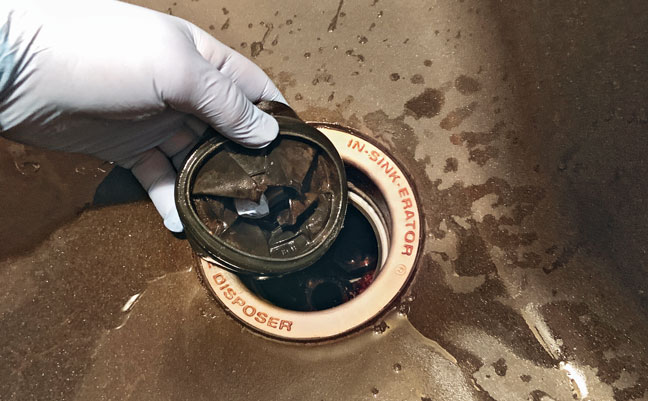- Vinegar flies in kitchens often are where you might not expect them.
- Fruit isn’t always a factor with these “small fruit flies.”

People rarely clean the bottoms of their garbage disposals’ splash guards, but the build-up can support several species of small flies. PHOTO: MARK SHEPERDIGIAN, BCE
The kitchen seems to be everybody’s favorite room in the house, and — at least in the clean, well-stocked ones — why shouldn’t it be? But there’s more than meets the eye inside every cupboard (well, inside some of them, anyway), surprises just around the corner, and the law of unintended consequences.
The customer reports vinegar flies (Drosophila spp.) have been showing up for weeks and all the fresh fruit has been thrown out, yet the flies continue. This may be the biggest reason to call them vinegar flies and not the synonym “small fruit flies.”
The fruit may be gone, but there’s usually some unrefrigerated produce still nearby. Potatoes and onions often are kept a long time in a cupboard or a bin, but they don’t last forever. Those on the bottom may get bruised, and the soft spots begin to rot. The next thing you know, there are vinegar flies breeding beneath.
In the summertime, bottom cabinets may be cooled by cold air ducts; in the winter, the heat kicks on and warms them, hastening rot and the development of flies. If you thought rotten onions were bad, wait until you encounter your first rotten potato. Phorid flies have been found in rotten potatoes. Ooh, ick. Wear gloves.
INSPECT THE GARBAGE DISPOSAL
If the flies are hanging around the sink, be sure to check the rubber guard of the garbage disposal. You can just pull it straight up (please wear gloves) and examine the underside. While the grinder at the bottom of the disposal is rinsed clean with every use, food that sticks to the bottom of this guard will stick and decay in a mass large enough to support quite a number of vinegar flies. This can be prevented by regularly pulling the guard and cleaning it thoroughly. Homeowners are understandably both disgusted at what you’ve found and glad you solved the problem.
In states that require a deposit on beverage containers, there usually is a stash of returnables waiting to be taken back to the store. The “bottle bills” were passed to clean things up, so instead of being thrown out, bottles and cans must be held until they are taken back to redeem their deposit. If any beer is left in these containers, vinegar flies will come looking for their share. While such regulations may have begun as an “environmental law” at the start, they turned out to be the law of unintended consequences. Rinsing beverage containers before storing them will prevent them from breeding flies — or for that matter, attracting ants.
When you look below the surface and around the corners, you’ll find the kitchen is full of surprises. Next month, we’ll explore a little more.
You can reach Mark Sheperdigian, BCE, vice president of technical services, Rose Pest Solutions, Troy, Mich., at shep@rosepest.com.
Leave A Comment